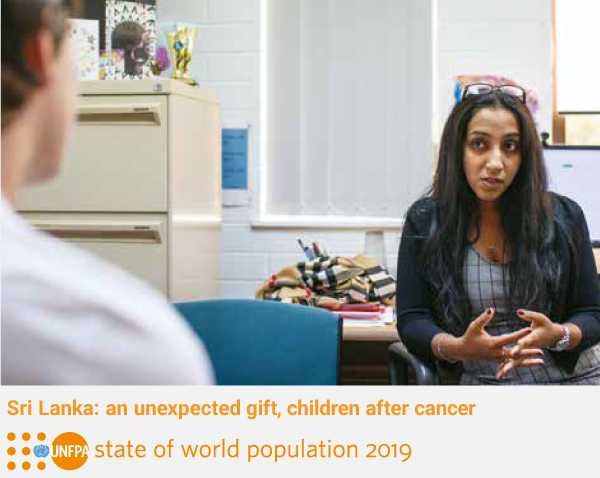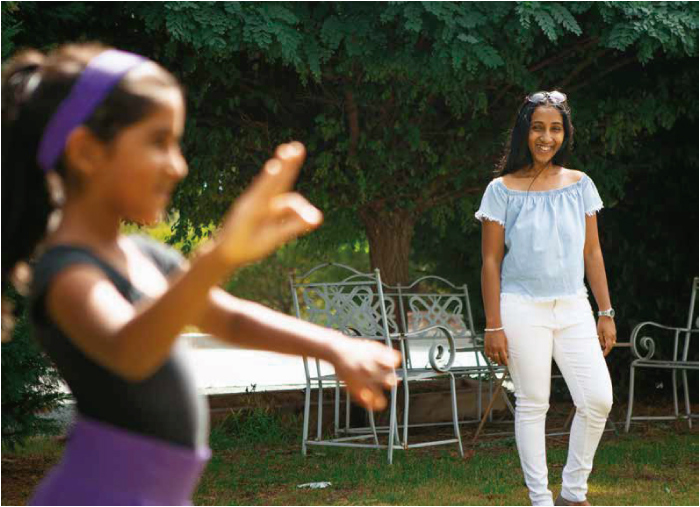
Rajasinghe Foundation for Vascular Research and Education:
Today marks the global launch of the United Nations Population Fund’s flagship report ‘State of World Population’.
This year’s report features the story of a resilient Sri Lankan woman and her miracle baby.
We hope Shara’s story will inspire many young women around the world to reach their fullest potential.
SOURCE: unfpa.org/swop-2019 pages 151-152
Sri Lanka: an unexpected gift—children after cancer
Ranasinghe’s early life was tumultuous. Her parents had divorced and the court stipulated that she, a single child, live with her father because he had financial stability and her mother did not.
“My mother was a brilliant child, but she never went beyond secondary school, and she married and had a child by 20,” Shara says.
After her father remarried, Shara suffered at the hands of a stepmother, who beat her at times.
When her own mother asked what had happened, she would make up excuses like she had fallen on the stairs, not wanting to stir up more concern and anger. Despite her unhappy childhood, Shara emerged with an independent and resilient spirit. After moving to Malaysia to pursue a university degree, she began to thrive until in her final year of studies she was diagnosed with cancer. She told her boyfriend that he really ought to leave her, but he refused, standing by her side through gruelling rounds of chemotherapy and radiation.
My mother was a brillant child, but she never went beyond secondary school, and she married and had a child by 20.
When it was over, the doctors said there was a low to zero probability that she would ever bear children.
At one point, she had been asked if she wanted to preserve her eggs, but the subject came up in front of her father and felt too uncomfortable for discussion.
She and her boyfriend decided to marry anyway, and soon after she found she was pregnant. “The stick turning positive was the best thing that ever happened in my life,” she confides Two more children have followed since then, and Shara has moved to Australia to pursue advanced degrees, aiming for a doctorate in communications with cancer patients. While she always wanted many offspring, each pregnancy poses some risk to her fragile health.

Financially, too, three feels like the right number. While Australia has subsidized childcare, she and her husband have worried about being away from their small children and juggled their work so that one parent could always be home with them.
At one point, Shara moved ahead in her teaching career and became the main family breadwinner, while her husband took time off from being an engineer to work flexible hours preparing food in cafes. More recently, his parents have come to live with the couple, and her husband has gone back to engineering.
In the world around her, she sees a growing openness, with women finally moving into leadership positions at her university, and a boy at her daughter’s school who has, for the first time, asked to be treated as a girl. Her first “miracle” daughter is now approaching 10, a talented, sensitive child. “I want her to be very strong,” Shara says.
“I hope she does not encounter discrimination, but there are still so many inequalities.”
She counts Australia as further ahead in understanding a changing world, compared to Sri Lanka, where she says the majority of people retain deeply conservative expectations of women. She enjoys the staunch support of her parents in making choices to pursue her dreams. But, she says, “my country has a few more years to go. I am hopeful that future generations will be born into a Sri Lanka that fosters equal opportunities for all.”
#SWOP19, #ICPD25, #UnfinishedBusiness
UNFPA | UNFPA Asia and the Pacific | United Nations Sri Lanka | United Nations


